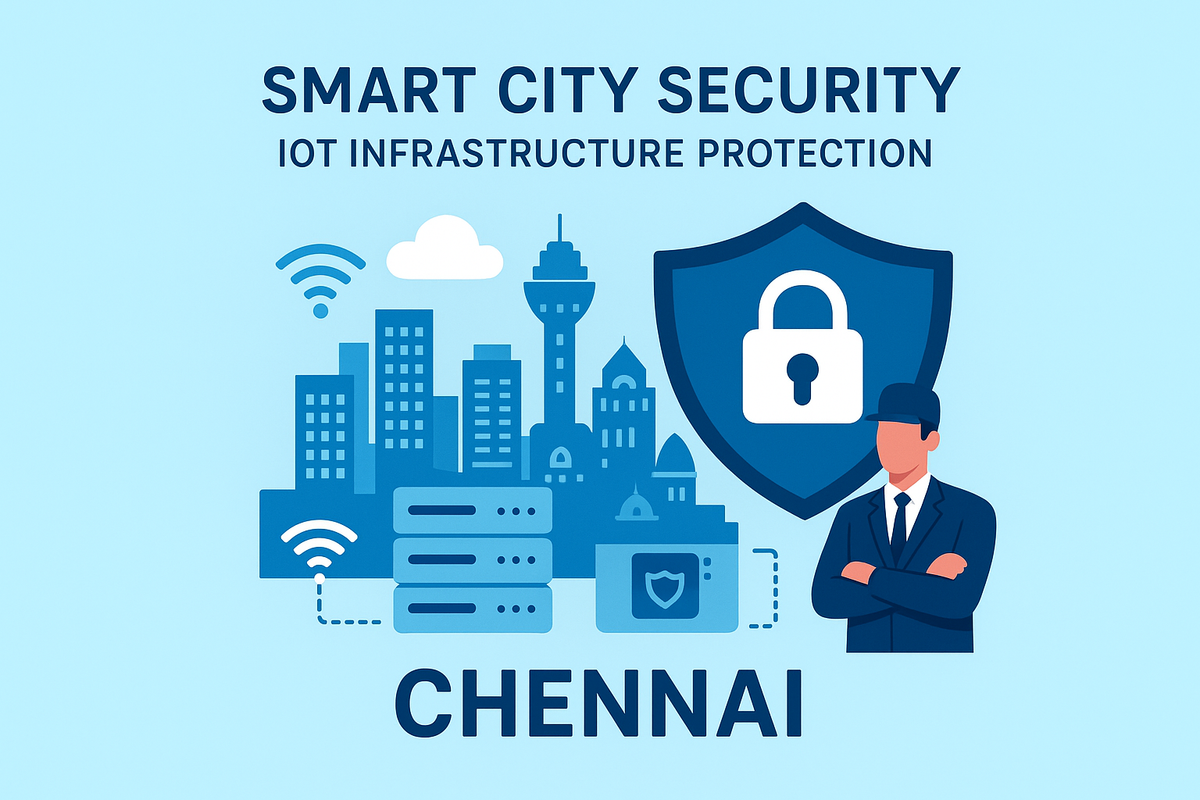Smart City Security Chennai: IoT Infrastructure Protection

Introduction
Chennai’s smart city transformation brings immense opportunity but also introduces critical cybersecurity challenges. As thousands of IoT sensors, connected systems, and intelligent platforms underpin city operations—from traffic management and public safety to water distribution and waste management—the attack surface grows substantially. Protecting this IoT infrastructure is not just a technical necessity, but foundational to public trust and efficient urban living.
The Vision: Chennai as a Connected Urban Hub
Chennai’s Smart City Mission focuses on leveraging technology for efficient, sustainable, and citizen-centric services. Its goals span enhanced livability, sustainability, urban resource optimization, and real-time digital governance. Key elements include:
- Integrated command centers monitoring traffic, utilities, and emergencies.
- AI-driven surveillance and citywide sensor deployments.
- Multi-tiered, digitally enabled public services.
Yet, every sensor, camera, and endpoint represents a potential entry point for cyber adversaries, making robust security frameworks indispensable.
IoT Infrastructure in Chennai Smart City
Core components of Chennai’s IoT-driven cityscape include:
- Smart traffic management with sensor-based signals.
- Dedicated fiber optic backbone across city zones.
- Smart surveillance (CCTV, analytics, face recognition).
- IoT-powered water and energy metering.
- Air quality, flood, and waste management via embedded sensors.
This convergence enables unprecedented efficiencies but creates new cyber-physical dependencies and risks.
Regulatory and Policy Context: India and Tamil Nadu
Chennai aligns with national and global standards, including:
- India’s Code of Practice for Securing Consumer IoT Devices (TEC 31318:2021), emphasizing unique device passwords, secure software updates, and “security by design.”
- Essential Requirements (ER) for CCTV and critical IoT systems, mandating certification and domestic security controls.
- CERT-In national guidelines detailing security architecture, network segmentation, cryptographic controls, and incident response measures for smart city operations.
- Local government guidance via the Tamil Nadu Smart Cities Mission and respective city SPVs.
IoT Threat Landscape for Smart Cities
Smart city IoT deployments are threatened by:
- Malware attacks targeting edge devices and SCADA systems.
- Unauthorized access, spoofing, and shadow IT in public Wi-Fi and open sensor networks.
- Supply chain manipulations in imported hardware/firmware.
- Denial-of-service (DoS) aimed at critical utilities and emergency systems.
- Data breaches from misconfigured cloud storage or weak identity controls.
Architectural Strategies and Layered Defense
Best practices to secure large-scale urban IoT:
- End-to-end encryption between endpoints and platform controllers.
- Logical and physical network segmentation to contain threats.
- Central authentication, device discovery, and continuous asset monitoring.
- Over-the-air (OTA) software updates for rapid vulnerability patching.
- Zero Trust approaches that verify each device and user before granting network access.
Real-World Initiatives: Chennai’s Implementation
Chennai’s IoT security posture is built through:
- Partnerships with national bodies (IoTSF Chennai Chapter, CERT-In) to build local capacity and share security intelligence.
- Integrated command centers aggregating real-time feeds and predictive analytics for incident detection.
- Workshops and research symposia to upskill municipal professionals in cybersecurity and IoT risk management.
- Annual smart city self-assessment exercises addressing non-motorized transport security, data privacy, and operational resilience.
Data Privacy and Citizen Trust
Smart city projects must uphold:
- Robust access control and encryption for sensitive data (surveillance footage, personal IDs).
- Transparent data retention and disposal policies.
- Privacy impact assessments for every major IoT project.
- Multi-factor authentication and audit logging for all operator actions.
Technology Evolution and Future-Proofing
Key recommendations for Chennai’s continued security evolution:
- Adopt AI-based anomaly detection across all city-critical IoT networks.
- Periodic red teaming and penetration testing for smart infrastructure.
- Cross-agency drills for smart city cyber-incident response.
- Inclusion of secure hardware roots-of-trust and regular firmware validation in procurement protocols.
- Continuous public-private engagement to keep pace with global smart city cybersecurity trends.
Conclusion
Chennai’s journey toward being a secure, efficient, and globally competitive smart city hinges on resilient IoT security. This challenge calls for harmonizing technology adoption, regulatory compliance, community awareness, and skilled professional collaboration. The right investments today will ensure Chennai’s smart city vision remains vibrant—and secure—well into the future.
Take the Next Step with CodeSecure Solutions
Cyber threats are growing more sophisticated every day. With a trusted partner by your side, you can safeguard your business while focusing on what truly matters—growth and innovation.
At CodeSecure Solutions, we deliver comprehensive cybersecurity services in Chennai, uniquely tailored for startups, SMEs, and enterprises:
- Vulnerability Assessment & Penetration Testing (VAPT)
- Network Security Solutions
- Compliance Support (ISO 27001, PCI-DSS, HIPAA, DPDP Act, GDPR)
- Cloud & Endpoint Protection
- Security Awareness Training
No matter your industry or size, CodeSecure customizes solutions to fit your needs—ensuring your data, reputation, and operations remain secure.
Ready to Strengthen Your Defenses?
- 📞 Call: +91 73584 63582
- ✉️ Email: vapt@codesecure.in
- 🌐 Visit: www.codesecure.in
Stay secure. Stay informed. Choose CodeSecure Solutions—your partner in cyber resilience.
